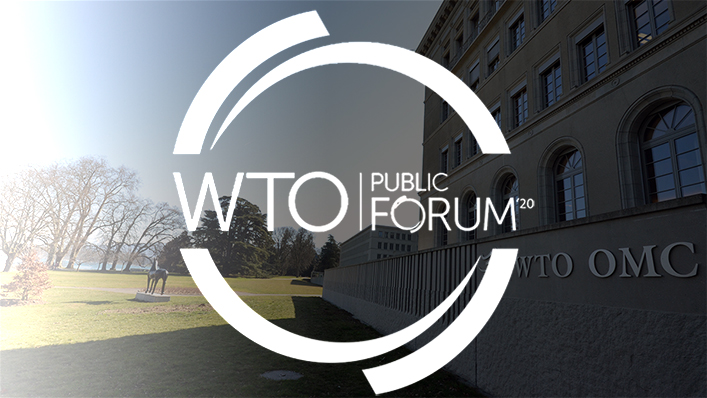The WTO’s role in telecommunications – Reinforcing development, innovation and a resilient economy
1 Oct 2021 12:30h
Event report
Telecommunications services and infrastructure underpin the fourth industrial revolution and the digital transformation that have changed the ways we work, communicate, and, essentially, live. The WTO Reference Paper on Basic Telecommunications, developed in 1996, has served as a blueprint for many regulatory agencies around the world as they develop and apply rules at the national and regional levels. Given the technological developments that have occurred in the last 25 years, this session discussed what the WTO telecommunications rules have achieved, whether it is time to review and update the rules, and what are the lessons learned about telecommunications infrastructure from the COVID-19 pandemic.
The WTO Reference Paper established guiding principles on telecommunications market regulations for regulators. By drafting rules and aligning them to the paper, regulators around the world have accomplished to architect and maintain telecommunications infrastructure that is unrecognisable in size and capacity compared to the one of 25 years ago. Mr Gordon Moir (Partner/Lawyer, elecoms Regulatory Expert, Wiggin LLP) reflected that good application of rules and principles incentivised investors, which has led to the growth of telecoms infrastructure. From a social development perspective, Ms Bernadette Lewis (Secretary-General, Commonwealth Telecommunications Organisation) added that telecoms infrastructure has democratised communications by providing people access to information and the ability to create and disseminate content.
While there is no doubt that the WTO Reference Paper has contributed to the development of telecommunications infrastructure and digital services, calls for its reform have been raised by several parties in the e-commerce negotiations. Ms Lee Tuthill (Former Counsellor, Trade in Services Division of the WTO) argued the key guiding principles in the paper, such as competitive safeguards, remain relevant and perhaps are even more important today than 25 years ago. Speaking from a business perspective, Ms Leona Mentz (Regional Operations Manager and Data Protection Lead, AMEA region, BT) proposed some areas of consideration for reform. She advocated that licensing criteria and timeline could use more clarity in the paper, as she experienced a prolonged and delayed timeline set by a regulatory entity.
To build back better from the COVID-19 pandemic and beyond, Moir warned of the overapplication of national security regulations against telecommunications services and infrastructure. He highlighted that the spillover effect of national security requirements would restrict access to the market and ultimately restrict competition. To address one of the key issues exacerbated by the pandemic, Lewis emphasised the importance of a collaborative approach among the competitors to make digital connectivity more available and affordable and reduce the digital divide.
Telecommunications services and infrastructure underpin the fourth industrial revolution and the digital transformation that have changed the ways we work, communicate, and, essentially, live. The WTO Reference Paper on Basic Telecommunications, developed in 1996, has served as a blueprint for many regulatory agencies around the world as they develop and apply rules at the national and regional levels. Given the technological developments that have occurred in the last 25 years, this session discussed what the WTO telecommunications rules have achieved, whether it is time to review and update the rules, and what are the lessons learned about telecommunications infrastructure from the COVID-19 pandemic.
The WTO Reference Paper established guiding principles on telecommunications market regulations for regulators. By drafting rules and aligning them to the paper, regulators around the world have accomplished to architect and maintain telecommunications infrastructure that is unrecognisable in size and capacity compared to the one of 25 years ago. Mr Gordon Moir (Partner/Lawyer, elecoms Regulatory Expert, Wiggin LLP) reflected that good application of rules and principles incentivised investors, which has led to the growth of telecoms infrastructure. From a social development perspective, Ms Bernadette Lewis (Secretary-General, Commonwealth Telecommunications Organisation) added that telecoms infrastructure has democratised communications by providing people access to information and the ability to create and disseminate content.
While there is no doubt that the WTO Reference Paper has contributed to the development of telecommunications infrastructure and digital services, calls for its reform have been raised by several parties in the e-commerce negotiations. Ms Lee Tuthill (Former Counsellor, Trade in Services Division of the WTO) argued the key guiding principles in the paper, such as competitive safeguards, remain relevant and perhaps are even more important today than 25 years ago. Speaking from a business perspective, Ms Leona Mentz (Regional Operations Manager and Data Protection Lead, AMEA region, BT) proposed some areas of consideration for reform. She advocated that licensing criteria and timeline could use more clarity in the paper, as she experienced a prolonged and delayed timeline set by a regulatory entity.
To build back better from the COVID-19 pandemic and beyond, Moir warned of the overapplication of national security regulations against telecommunications services and infrastructure. He highlighted that the spillover effect of national security requirements would restrict access to the market and ultimately restrict competition. To address one of the key issues exacerbated by the pandemic, Lewis emphasised the importance of a collaborative approach among the competitors to make digital connectivity more available and affordable and reduce the digital divide.
Related event

